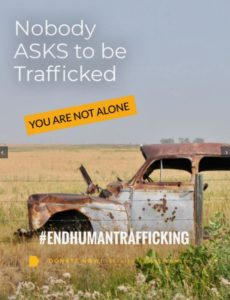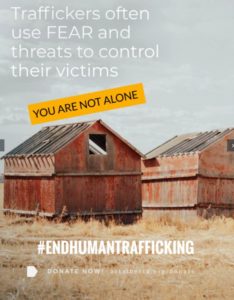
— Graphic supplied by ACT Alberta
Health professionals may have an ability to root out cases of human trafficking in rural Alberta just by asking a few pointed questions.
“Health care is one of the most critical points of intervention and victims of human trafficking often slip through the cracks in the system,” said Amanda Warnock, an anti-trafficking educator with the Action Coalition on Human Trafficking (ACT Alberta) for rural and northern Alberta.
“I know it’s hard to catch everyone, but sometimes it just takes one conversation, one question, one point of contact to make a difference.”
A human trafficking victim once recommended asking some probing questions such as “does he make you do anything that you don’t want to do?” or “what happens with the money?” may be an opening for a victim to to speak up about their situation with a health professional or other intervenor.
ACT Alberta officials are currently working on a campaign to bring awareness to the issue in rural Alberta.
The organization has set up working groups in northern and southern Alberta to discuss how to best connect with communities, Indigenous groups, and others to spread awareness of human trafficking.
“There are a lot of people who don’t notice or don’t know that [human trafficking] is happening here,” said Mahi Chahal, an outreach coordinator with ACT Alberta.
“They think, ‘we’re in Canada, or we’re in Alberta; it doesn’t happen here.’ But it does happen here.… People are kind of shocked.”
Human trafficking isn’t new to Alberta. It occurs in industries including construction, hospitality, agriculture, childcare, seniors/respite care, and personal health and wellness. Both international and local victims can be impacted.
“There are a lot of people who don’t notice or don’t know that [human trafficking] is happening here. They think, ‘we’re in Canada, or we’re in Alberta; it doesn’t happen here.’ But it does happen here.… People are kind of shocked.”
— Mahi Chahal, an outreach coordinator with ACT Alberta
Identifying cases can be tricky, but health professionals may be in a position to notice or inquire if some tell-tale signs show up when victims seek medical help.
Over the past two years, ACT Alberta has seen a rise in labour trafficking across the province. This increase is supported by data received from stakeholders, as well as the United Nations 2020 Global Report on Human Trafficking, which states “the COVID-19-induced recession is likely to expose more people to the risk of trafficking. Millions of women, children and men worldwide are out of work, out of school and without social support in the continuing COVID-19 crisis, leaving them at greater risk of human trafficking.”
Rural and remote locations are ideal places for human trafficking due in part to isolating factors such as limited transportation options and fewer opportunities for workers to mix with the community at local businesses and services, said Warnock.
“When you’re in a small town and nobody speaks your language, where are you going to reach out?
“Some of these people from international locations might not know the rules, regulations, and laws in Canada, and might not have a place in rural communities to reach out and ask, ‘is this legal? Is this okay?’”

— Graphic supplied by ACT Alberta
Human trafficking cases can be complicated, said Warnock. Sometimes, the traffickers coordinate unscrupulous working and living arrangements far away from the place of employment with local employers being unaware that the workers are being exploited.
In some cases, local people may be doing the trafficking.
Today, requests for ACT Alberta’s support come through community and stakeholder partners, as well as from people who self-refer, said response coordinator Kalena*, whose region stretches from Edmonton north to the Alberta/Northwest Territories border.
She recalled a recent case involving two hospitality workers who faced poor working conditions in a small northern community.
“They were made to work excessively long hours [with] no breaks [and] weren’t paid [appropriately] for their work. [They] were forced to live in really small living quarters that were extremely unhygienic which landed them some health issues,” she said.
“The trafficker had … kept a lot of their documents so their ability to prove who they were or be able to navigate with anyone that they come across, was more limited.
“One day, they just decided that it was time to get out and they escaped on foot and travelled for quite some time to an RCMP detachment in some wintery conditions with [a] lack of appropriate clothing.
“Thankfully, they made it there.”
RCMP reached out to ACT and Kalena was able to help the workers with their immediate needs such as medical care, housing, and other supports, as well as arranging for longer term assistance and legitimate work.
Kalena said the workers were likely lured into Canada with promises of a lucrative job.
“The employer promised them that they could come here and have a full-time job, have weekends off, and make this much money. They just essentially promised them a lot of things that they never intended to fulfill. Something that I believe [was also a] contributing factor is the lack of knowledge of what [their] rights [were] as a worker.”
The case has since been handed over to the police and other authorities.
“When you’re in a small town and nobody speaks your language, where are you going to reach out?”
— Amanda Warnock, an anti-trafficking educator with the Action Coalition on Human Trafficking (ACT Alberta) for rural and northern Alberta
Barriers to escape include a mistrust of law enforcement officials that might link back to their home countries, concerns over losing their immigration status, fear of their traffickers, mental health or addiction issues, and possibly trauma.
By spreading the word that trafficking occurs province-wide, ACT Alberta officials hope more people will recognize if something doesn’t seem right in certain situations.
Human traffickers, for example, often limit the movement of their workers by accompanying them to the bank in order to control their finances and limit other activities. Health facilities may offer an opportunity for workers to have some privacy and disclose their concerns.
ACT Alberta’s outreach campaign will share information through posters and other materials that identify what human trafficking may look like, how to get help, and where to seek assistance. A half-day course can also be presented at health-care settings.
ACT doesn’t provide 24/7 support, but the Canadian Human Trafficking Hotline can be reached at 1-833-9000-1010. More information on human trafficking is available on ACT Alberta’s website or by calling 780-474-1104.
*Editor’s note: Some names in this article have been withheld for safety reasons.
